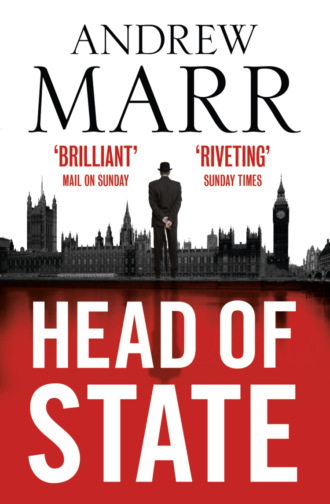
Полная версия
Head of State: The Bestselling Brexit Thriller
One day as he was sitting at his desk, the managing editor had found himself wondering whether, as wealthy parents were clearly willing to subsidise their offspring, some of them might be prepared to go further, and actually pay the Courier to employ them. So the trainee’s banker father was currently paying £30,000 in return for his son working at the paper. He regarded it as money well spent: if he paid £100,000 for a painting so he could boast about it at dinner parties, and many times that on dull holidays so he could boast about them, £30,000 was a small price to pay to allow him to boast about his dim but well-meaning son’s journalistic career. Half of the money was going into the newspaper’s coffers; the other half was going to the managing editor. The managing editor feared that one day Ken Cooper would discover what was going on; and that would be an unpleasant day. So the trainee could not stay forever. He was just an experiment. In the meantime, everybody called him ‘oi’. The trainee, who dreamed of being a gossip columnist, was not put off, however. He had sticking power. He passionately believed that one day, somehow, someone would tell him too to fuck off.
How History is Made
At the moment that Ken Cooper stepped into the lift, Lord Trevor Briskett and his research assistant Ned Parminter were squashed together in a commuter train from Oxford. They were both scanning that morning’s Courier. Lord Briskett read the paper from the middle outwards, starting with the editorial and the commentators, then checking the business and political news, before idly skimming the home pages, which were mostly filled with things he’d heard already on last night’s news or the 7 a.m. bulletin on the Today programme. One celebrity was in favour of decluttering. Another was less sure. The girlfriend of somebody on a television show had drunk too much in a club. The age of newspapers, he reflected, was coming, whimpering, to an end.
Ned Parminter was brushing through the iPad edition of the paper with his forefinger, flicking the screen at great speed. The Courier at least still covered politics with some vigour, although the news pages seemed to be in favour of Britain leaving the EU, while the comment pages were aggressively the other way.
Neither of them paused to read the short report on the headless Battersea corpse. Corpses, particularly headless ones, were clearly something to do with the criminal underworld, and were therefore politically unimportant. Briskett and Parminter were following a bigger story than that. ‘Vote clever.’ ‘Vote for freedom.’ A nation torn in two.
Dressed in his trademark coarse green tweeds, with his halo of frizzy white hair and heavy horn-rimmed spectacles, part A.J.P. Taylor, part Bamber Gascoigne, Trevor Briskett was famous enough from his TV performances to attract second glances from his fellow commuters. On the streets of Oxford – that crowded, clucking duckpond of vanity and ruffled feathers – he was stopped-in-the-street famous.
And rightly so. For Briskett was the finest political historian of the late twentieth and early twenty-first centuries. His early biographies – Blair, Thatcher, Johnson – were still in print, while the memoirs of scores of almost-forgotten politicians had long since vanished to charity shops and recycling dumps after selling only a few score copies. Briskett’s account of the modern constitution had been compared to the works of that Victorian master-journalist Walter Bagehot. His history of British intelligence during the Cold War had been praised by all the right people. Emeritus professor at Wadham, winner of numerous literary prizes, elevated five years ago to the Lords as a crossbencher after chairing a royal commission on security lapses at the Ministry of Defence, Briskett was regularly tipped to be the next member of the Order of Merit.
Yet somehow these decorative embellishments, which might have weighed him down and made him soft, slow and comfortable, had had little apparent effect on Trevor Briskett. At seventy he was as sharp, as boyishly enthusiastic, as wicked a gossip with as rasping a laugh, as he had been at thirty. The exact nature of the pornography discovered on the minister’s lost laptop. The attempt to blackmail a senior minister over his wife’s cocaine habit. Just who Olivia Kite was taking to her bed these days … If you really wanted to know, you went to Briskett, and he would tap his nose, lean towards you, give a wolfish smile and a ‘dear boy’, and spill all the beans.
Thus, it had generally been admired as a rather brave decision when the prime minister announced that he had appointed Briskett as the official historian of the great European referendum. The PM, himself an amateur political historian, had argued that such was the momentous nature of the choice now before the British people that they were owed – the nation was owed – a proper, in-depth account by a proper writer. Briskett, he had promised, would be given unparalleled access to the members of his inner team for the duration of the campaign. He would be welcomed at Downing Street, he would be given copies of the emails, the strategy documents – everything. And after it was all over, people might actually read his book.
No sooner had the PM announced this than Olivia Kite, on behalf of the get-outers, issued a press release declaring that she too admired Lord Briskett, whom she regarded as an authoritative and independent voice, and that she would give him the same level of access to her team.
The political commentators said that the PM’s decision to give contemporary history what Briskett had called ‘the ultimate ringside seat’ was evidence of his great confidence about the outcome of the referendum. His evident conviction that he would win, and that victory would be the ultimate vindication of his premiership, was itself damaging to his opponents. Olivia Kite had had little option but to make Briskett as welcome in Prince Rupert’s tent as in Cromwell’s.
Basking in this hot limelight, Briskett moved lightly. He wanted to do all the work himself, so far as he could. He had brought in only his protégé Ned Parminter, a shy but brilliant PhD student who, Briskett thought, might one day be a significant contemporary historian himself.
Parminter, with his wiry black beard and intense dark eyes, looked like an Orthodox priest in civilian clothes. Although he shared Briskett’s urbane sense of humour, his romantic English patriotism had a fanatical streak.
Together, the two of them made up a balanced ticket: Briskett’s delight in Westminster gamesmanship inclined him towards the larger-than-life, principled yet unscrupulous figure of the prime minister. Parminter, a specialist in the seventeenth-century development of Parliament, was a natural Olivia Kite supporter. They had, of course, never discussed their allegiances on this matter between themselves.
Now the two of them were on their way to meet the prime minister himself. As the train wriggled through West London towards Paddington, Briskett leaned forward in his seat.
‘You’re seeing that … girl, Ned, after our rendezvous?’
Parminter scratched his beard under his chin, a sign of anxiety, before slowly replying. ‘She’s invaluable. She’s across everything in the Kite campaign. She reads all the emails, all Kite’s texts, on her official BlackBerry and her personal one. She’s copying us into every piece of traffic.’
‘And does the ever-lovely Mrs Kite know this?’
‘Apparently. I think she must. Jen’s nothing if not loyal, so I guess Kite’s fine with it.’
‘Good girl. Good for you, too.’
‘There is one other thing. It’s a bit odd. She also seems to know rather a lot about what’s happening on the other side. Far more than she ought to. Hidden channels in Number 10, perhaps.’
Briskett rubbed his hands with pleasure.
‘Really? Sleeping with the enemy, is she? Delicious. At a moment like this, what is happening in each HQ is our primary concern. Let us wallow, Ned, in the panics, the little feuds, the unwarranted pessimism and the foolish overconfidence. But in a sense, what matters most is what is harder to discover. I mean, what is happening between the camps. It’s there that the deepest secrets lie. And what is this fascinating creature’s full name, Ned?’
‘Jennifer Lewis. But she prefers Jen. I’ve known her since uni.’
Briskett exhaled an irritated hiss.
‘You mean you’ve known her since you were up at Oxford, Ned. I really cannot understand this squirming self-abasement about “uni”. It would be a different matter if it were Keele, but I assume – given her youth and prominence – that she was at Oxford too. Or, poor girl, Cambridge?’
‘Somerville.’
‘Hmm. PPE?’
‘PPE.’
‘Well …’
The two men lapsed into silence until the train was almost at Paddington.
Under a Rebel Flag
But Jennifer Lewis was not going to make her appointment with Ned Parminter that afternoon. Some fascinating new polling results had come in overnight which called for a few late changes to the campaign, so she was more than sixty miles to the east of London, crunching numbers in the gorgeous surroundings of Danskin House. Olivia Kite, meanwhile, dressed only in a short, almost see-through kimono, walked between the rows of campaign volunteers checking the messages on her mobile phone. Nobody even thought about taking a picture. They were a tight, loyal team.
After breakfast Olivia changed the kimono for a vibrantly-coloured Issey Miyake suit; she made a point of dressing up for every day at work in her own home as if she were being presented to the king at Buckingham Palace. He had, after all, called her half a dozen times in the course of the campaign. Some of their conversations had run on late into the night.
Danskin House was the beating heart of the nationalist movement. It was rebel camp headquarters, as much a symbol of defiance of Westminster as Oxford had been when King Charles I had raised his standard there almost four centuries previously. Yet it was an odd place for British patriotism to take its stand. The house was vaguely Renaissance in shape, and was hung with Dutch tiles. Its roofs and turrets glittered pale blue and orange. It boasted an Italian garden, complete with eighteenth-century reproduction Roman statuary, and a Greek temple overlooking a lake. Inside, a long hallway was decorated with suits of German armour and some quite good paintings, not least by the Dutchman Pieter de Hooch and the Spanish papist Murillo. What had once been an insanitary Tudor patchwork had been extensively rebuilt in Northern European style after the Glorious Revolution – the glazed tiles, the statues, the limewashed inside walls.
The house’s current master, Olivia Kite’s husband Reeder, was half American and half Egyptian. Yet, because it happened to nestle alongside a tiny Essex river, Danskin had long since become an emblem of Englishness, featuring in Jane Austen television documentaries and Christ Almighty, a recent Hollywood adaptation of Evelyn Waugh’s biography of Ronald Knox.
On this particular morning, a dim boy leaned on his rake in the grounds and watched a procession of cars crunch along the gravel drive, then disgorge their passengers between the pillars and into the main entrance of the house. He spat on the ground. He may have been a fool, but he was not so stupid that he didn’t know what was going on.
In the formal garden to the rear of the house, Reeder Kite strolled past the chipped and forlorn Venus and the amputee Adonis and arched his back against the late-summer heat. Already-blown roses oozed a sensuous, sickly scent, intensifying when it met the livelier stench of a trellis of sweet peas around the sundial. Butterflies and bees drifted over borders of rich, moist soil, thickly strewn with astrantia, allium and abelia, mildly invaded by vetch and willowherb. Fertility was everywhere.
Reeder scratched his inner thigh, probed himself, and wondered how soon after lunch he could escape back to London, where his mistress would be idling in her mews flat. He admired his new Nike trainers, his still-strong legs, then tensed his gut – there were still a few muscles there – thrust his arms out in front of him and squatted down. At that moment Olivia happened to glance through the window, and saw her near-naked husband performing his strength and balance training. He looked, she thought, like a walrus attempting ballet.
There was a curious mismatch between the temperatures inside and outside the house. Within its walls, Danskin felt as cold as death. Over the past few months the woman in the mews house in London had destroyed whatever human warmth had once been found there. The effect of Reeder’s adultery had spread like an icy mist, floating down corridors and lurking under beds. Olivia no longer ransacked his email inbox or stabbed her way through his mobile phones, but had instead redirected her fury into a last spasm of energy in the referendum campaign. Each morning the family exchanged chilly platitudes over the breakfast table. Protracted silences and accusatory glances had replaced the former veneer of civility.
As if to echo the dismantling of the family, the main downstairs rooms had been cleared of pictures, books and domestic clutter. Boxes of old photographs, football boots, scented candles, CDs and unloved Christmas presents had been crammed into cupboards and forgotten. The ghostly outlines of Turkish rugs lingered on the bare wooden floors. Where once there had been elegant reproduction antique chairs and polished occasional tables, there were now rows of hurriedly-assembled flatpack desks and plastic chairs. Cables coiled in every direction from computers and printers set up throughout what had been the dining room, the sitting room and the second kitchen. Piles of cardboard boxes filled with files and labelled with thick ink marker teetered in the corners.
Maps of parliamentary constituencies, graffitied with numbers and names, had been pinned onto the walls, and flatscreen televisions were in every room, permanently broadcasting the BBC and Sky news channels. During working hours the rooms were full of smartly dressed young people crouching over their desks with serious expressions, their heads pressed to phones, their necks eternally cricked even as their fingers danced on keyboards. Outside, the background noise was hum and whoosh, living rural England; inside, it was tap and mutter.
At first Olivia Kite’s decision to move the headquarters of the No to Europe, Democracy First campaign away from Westminster and into the expensive country house where her marriage was ending had seemed inexplicable. In fact it was a stroke of genius, distancing the campaign from the political establishment in London, and fusing together its couple of hundred dedicated staff out in the sticks. Their sequestered camaraderie meant that their movement had come to feel like a popular insurgency – and so, in a way, it was. Greece had exploded, Spain was dividing, France was on the march; and now it was Britain’s turn. Far away from elderly, cynical Whitehall, this was a Spitfire summer. For the men and women serving under Olivia Kite, Danskin House was Fighter Command.
The house was not in fact quite as remote as it might have seemed. Just beyond the forest of oak and Scots pine that surrounded its formal gardens and strip of parkland was a busy coastal town, with a good road link to the M11, along which an endless stream of lorries trundled, bringing cars from Germany and containers full of almost everything else from China. Its railway station required only one change from Liverpool Street, and the local taxi drivers had become accustomed to cabinet ministers and minority party leaders, never mind television journalists and other hangers-on, arriving off the morning and evening trains with a self-important air and asking for ‘Mrs Kite’s place’.
Despite the container ships that arrived in the port every few hours, the European Union was deeply unpopular in this northern corner of Essex. Union flags flew from pubs and public buildings, and Mrs Kite, partly because her husband’s reckless infidelity was a rich source of local gossip, was hugely popular here.
As for Olivia herself, she had recovered her domestic territory and stamped it with her own political identity; her skulking, pirouetting husband was beginning to feel like a stranger in his own home. Lionel, their eldest son, who was going through an REM phase, referred to his father simply as the Oaf. ‘Living Well is the Best Revenge’ echoed along the upstairs hallway as Olivia stared at her husband’s froggy face flushing in the garden and thought, ‘No, it bloody isn’t. Stamping on his face with stiletto heels, before burning all his dreams in front of his staring eyes, ripping his fingernails off one by one and humiliating him in the newspapers … that would be the best revenge. But if that’s not an option, I suppose living well is an acceptable second choice.’
Olivia was the Cavalier commander. But she had no intention of losing her head. She had more of Oliver Cromwell about her than any languid Stuart. Jennifer Lewis, by contrast, definitely had the looks of a Cavalier lady: a long, serpentine body, delicate, pale features and hair for whose colour there was no adequate description – corngold and copper, silver birch with licks of flame. With her green eyes and large, capable hands, however, she was a fighter too, and an eager footsoldier in Olivia Kite’s parliamentary insurgency. Olivia treated her almost as a daughter, and relied very heavily on the younger woman’s uncanny grasp of numbers and down-to-earth political sense.
Through the frantic weeks of the referendum campaign Jen was at her boss’s side most of the time, expressionless, taking calls and giving orders. But today her provocative eyes seemed lost in thought. She couldn’t get her mind off her last meeting with her former lover, the newspaper reporter Lucien McBryde. A man with a considerable talent for self-destruction, he now seemed to be falling apart at a spectacular rate. Texts she had received over the weekend told her he had been leaving her messages, even now, through their very private system.
Конец ознакомительного фрагмента.
Текст предоставлен ООО «ЛитРес».
Прочитайте эту книгу целиком, купив полную легальную версию на ЛитРес.
Безопасно оплатить книгу можно банковской картой Visa, MasterCard, Maestro, со счета мобильного телефона, с платежного терминала, в салоне МТС или Связной, через PayPal, WebMoney, Яндекс.Деньги, QIWI Кошелек, бонусными картами или другим удобным Вам способом.







